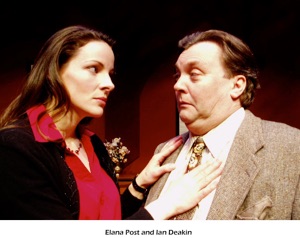Reviews 2007






✭✭✭✩✩
by Tennessee Williams, directed by Neil Munro
Shaw Festival, Royal George Theatre, Niagara-on-the-Lake
July 6-October 27, 2007
"Smoke but Not Fire"
Surprisingly enough, “Summer and Smoke” is the Shaw Festival’s first foray into Tennessee Williams. Let’s hope it is the first of many. Except for a couple of casting problems, this is a fine production and highlights the Festival’s chief treasure--its ensemble acting.
“Summer and Smoke” (1948), Tennessee Williams's first play after “A Streetcar Named Desire” (1947), is not often revived. One reason is that the play moves towards paradox rather than tragedy. Another is that the play requires a complex set capable of depicting at least three major playing areas. Yet another is that Williams adds eleven minor characters to what is essentially a two-character struggle. Despite this, the work is a must for all Williams fans since it presents his favourite characters, the Southern belle and the ne'er-do-well male, in their most archetypical form.
The central character is shy, overly self-conscious Alma Winemiller, who has always loved the boy next door, John Buchanan, Jr., the son of a doctor now training to follow in his father’s footsteps. His return to Glorious Hill, Mississippi, in 1913 reawakens a desire that years of propriety as a reverend's daughter and shame in caring for a mentally disturbed mother have locked away. John respects Alma but seems intent on throwing away his life in gambling, whoring and liquor. As her allegorical name suggests Alma is the soul, spirituality and moral purpose, while John is the body, sensuality and practical skill. As symbols each needs the other. As people, both must overcome mental constraints to realize this need.
Neil Munro directs with his usual precise attention to detail. The one flaw he cannot overcome is the miscasting of Nicole Underhay as Alma. I have enjoyed Underhay in many other productions but here she is simply too robust and vital an actor to portray Alma convincingly. She conveys Alma’s tendency too talk too much as nervousness, but not the sense of making a fool of herself that should accompany it. Her movement and gestural language are appropriate to an assured, lively character, not someone who makes up excuses to visit the doctor just for companionship. Underhay is best in her interactions with Sharry Flett as her mother, where Underhay conveys the stress, irritation and sadness of having act as a parent to one’s parent.
The rest of the parts, with one exception, are all well cast. Jeff Meadows is excellent as John Buchanan, Jr., a young man whose loss of faith has sent him on a path of self-destruction. Meadows shows that John is in the painful position of knowing what he is doing and knowing he can do nothing about it as if he is watching himself slide into the abyss. His natural charisma makes the attentions he draws from all women, including Alma, self-explanatory. As John’s father Guy Bannerman is stern and gruff, perplexed but ready to forgive. Peter Hutt gives a fine performance as Alma’s father Reverend Winemiller, who seems incapable of dealing with his wife’s mental illness by leaving the difficult work to Alma. Jay Turvey provides a subtly comic portrait of Roger Doremus, Alma’s only potential love-interest aside from John. He is as awkward and shy as Alma is and seems so tied to his mother’s apron strings we have to feel there is no hope there for her.
Among the women Sharry Flett stands out for her eerie portrayal of Alma’s mother. Mrs. Winemiller’s dementia has turned off her inhibitions leading to childish behaviour and embarrassing statements in public. Flett’s eyes flit between vacancy and mischievousness making the woman’s intractability all too believable. Nicola Correia-Damude manages to keep Rosa Gonzales, John’s hot-blooded Latina “girlfriend” from being a caricature. Brigitte Robinson as the snooty Mrs. Bassett, Melanie Janzen as a geeky Rosemary and Chilina Kennedy as the young but unthinking Nellie Ewell round out the cast. It’s a pity that Jonathan Gould as travelling salesman Archie Kramer ruins the final scene of the play. He seems merely like a wide-eyes tourist happy to see the sights rather than the slimy fellow he should be ready to take advantage of the first woman he meets.
To emphasize the spiritual aspects of the drama, Peter Hartwell has created a set that from the back of the theatre looks like the outlines of a wooden church. The two side-aisles are the Buchanan house stage right and the Winemiller house stage left. The centre aisle is represents the town park and its water fountain, which when not in use upstage looks like an altar and baptismal font. Close up this pattern is unclear and the set looks more like a forest of dead trees. Christina Poddubiuk has created attractive period costumes and thankfully makes Rosa’s father look like a wealthy businessman rather than the Mexican bandito seen in other productions. Lighting designer Alan Brodie captures the effect of living in a world where blinds are mostly closed against the outside world.
The best Canadian production of “Summer and Smoke” remains for me the Theatre Plus production in Toronto in 1991 with Kate Trotter as Alma and Patrick Galligan as John. Trotter gave us an Alma so fragile that she seems to holds herself together only by force of will. Tom McCamus was the travelling salesman of the final scene and his callousness gave Alma’s fall from grace devastating impact. The Shaw production may not quite hit the mark, but so much else is right I hope the Festival will enrich future seasons with more of Williams’ works.
©Christopher Hoile
Note: This review is a Stage Door exclusive.
Photo: Jeff Meadows and Nicole Underhay. ©David Cooper.
2007-09-17



Summer and Smoke






